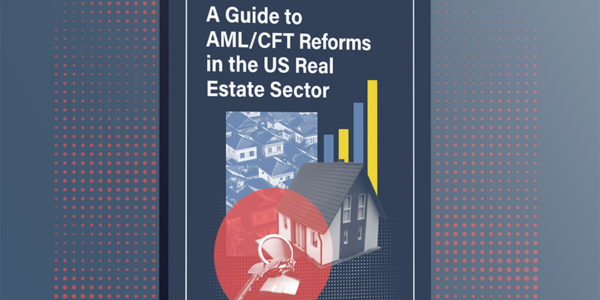
A Guide to AML/CFT Reforms in the US Real Estate Sector
Learn how real estate businesses can respond to US authorities' new measures for improved corporate transparency and financial crime risk management.
Download Your CopyInvestment fraud has become the most expensive form of fraud in the US, according to a report by law office Carlson Law. The report states that a staggering $3.82 billion was stolen in 2022 – a significant increase from the previous year’s $1.6 billion. Although the number of investment fraud offenders has decreased in the last five years, the US Sentencing Commission has reported a significant increase in median losses incurred, which is now over $2,880,000. Our 2023 global compliance report also highlighted this trend, with investment fraud emerging as a top concern for firms worldwide.
Investment scams are also rife within real estate – a sector that remains America’s favorite long-term investment despite the increasing risk of fraud. This article considers one particular real estate investment fraud type, known as REIT fraud.
Real estate investment trusts (REITs) are investment vehicles that allow individuals to invest in real estate without owning the physical properties themselves. These trusts own, operate, or finance income-producing real estate, such as apartment buildings, hotels, shopping centers, or office buildings. REITs are subject to specific regulations and offer certain tax advantages, making them attractive investments for many.
Real estate investment trust fraud occurs when bad actors try to sell REIT investments that turn out to be scams. Unfortunately, this type of scam is not uncommon, and it can be perpetrated by various entities such as fraudulent companies, stockbrokers, and financial advisors. These bad actors often use deceptive tactics to persuade individuals to invest in risky REITs, promising low risks and high returns. While such investments may seem attractive initially, many investors have lost significant value due to uncertain investments in particular REITs.
REIT fraud can happen with any type of REIT, but non-traded REITs are more susceptible due to the limited disclosures required for these investments. Investors in non-traded REITs can be victims of fraud in various ways. Common tactics used in REIT fraud schemes include:

Learn how real estate businesses can respond to US authorities' new measures for improved corporate transparency and financial crime risk management.
Download Your CopyFinancial red flag indicators relating to REIT fraud include:
The Securities and Exchange Commission (SEC) regulates REITs in the United States. REITs must adhere to strict disclosures and reporting requirements, including the submission of regular financial reports and disclosures of material information. This information must also be disclosed to the investors, as well as financial statements, property portfolios, and investment strategies. The SEC conducts examinations and investigations to detect and prevent fraud in the REIT industry. Independent audits by certified public accountants are also typically mandatory for REITs. These audits help verify the accuracy of financial statements and detect any irregularities or fraudulent activities.
While regulatory measures may differ from one jurisdiction to another, investors and industry professionals should be aware of the specific rules and regulations that apply to REITs in their region and stay informed of any updates.
Mitigating REIT fraud risks is crucial for financial institutions to uphold regulatory compliance, protect stakeholders, and safeguard the integrity of financial markets. Some strategies include:
Additionally, in the UK, the 2023 Financial Conduct Authority (FCA) Handbook provides a list of best practices FIs should follow when screening for different types of investment fraud. Firms in the US should take note of these tips, which include:
To combat the rising threats of real estate scams, including REIT fraud, compliance teams should consider their transaction fraud risk across three core areas of compliance:
Request a demo to see how our fraud detection capabilities can help you see the unseen.
Get Started NowOriginally published 24 October 2023, updated 03 September 2024
Disclaimer: This is for general information only. The information presented does not constitute legal advice. ComplyAdvantage accepts no responsibility for any information contained herein and disclaims and excludes any liability in respect of the contents or for action taken based on this information.
Copyright © 2025 IVXS UK Limited (trading as ComplyAdvantage).